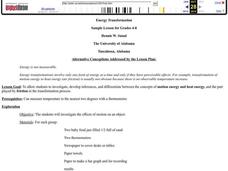Curated OER
Energy Transformation
Students experiment with variety of materials to investigate, develop inferences, and differentiate between concepts of motion energy and heat energy, and the part played by friction in the transformation process.
Science 4 Inquiry
Introducing the Types of Energy
Young scientists explore many different types of energy including light, heat, nuclear, sound, potential, and more. They match the types of energy and identify when energy transfers from one type to another.
Curated OER
Energy Transformation with Simple Machines
First graders identify both potential and kinetic energy in a game they play in the classroom. They listen as the teacher explains the difference between potential and kinetic energy when observing a simple machine. Using simple...
Savvas Learning
Let's Get Moving
Scholars examine, cut, paste, and sort 12 images featuring different types of movement in order to show what they know about energy—potential and kinetic.
Curated OER
Energy Is Everywhere
Young scholars determine the difference between renewable and non-renewable resources and identify the different forms of energy. They discuss life without energy and where energy comes from before reading an article about the different...
CPO Science
Physics Skill and Practice Worksheets
Stop wasting energy searching for physics resources, this comprehensive collection of worksheets has you covered. Starting with introductions to the scientific method, dimensional analysis, and graphing data, these skills practice...
Chicago Botanic Garden
Albedo, Reflectivity, and Absorption
What is reflectivity, and what does it have to do with the Earth's climate? As reflectivity is measured by albedo, scientists can gather information on Earth's energy balances that relate to global warming or climate change. Budding...
Curated OER
The Sun Affects Earth
Third graders read, write, and listen to information about the sun and its effects on the Earth.as it relates to its axis, orbit, rotate, and revolution. In this solar system lesson, 3rd graders examine how the sun...
National Institute of Open Schooling
Spontaneity of Chemical Reactions
Do spontaneous reactions really occur? Activity 12 in a series of 36 focuses on spontaneity of chemical reactions. Learners read about, discuss, and answer questions pertaining to entropy, explain the third law of thermodynamics, explore...
K12 Reader
Extreme Weather
Thunderstorms, tornados, blizzards, hurricanes. These extreme forms of weather are the focus of an article on a two-part reading comprehension worksheet. After reading the passage, kids use information in the text to respond to a series...
Curated OER
The Rifting of Pangaea and the Gettysburg Battlefield
Eleventh graders analyze and interpret an animated model of Earth’s rifting processes. In this Earth Science lesson, 11th graders connect Earth’s rifting processes with the Earth’s surface in the Gettysburg battlefield. ...
Curated OER
Classification of Clouds
Students view progressive slides of cloud formations and identify which type of cloud is shown as it forms. They estimate the cloud's height while viewing each image.
Virginia Department of Education
Predicting Products and Writing Equations
A chemistry lesson presents 14 chemical reactions for scholars to observe, write the equation, and balance the equations. Additionally, it provides ways to extend the activity as it relates to catalysts.
Curated OER
Roofing and Right Triangles
Young scholars use models and symbols to represent properties of the Pythagorean Theorem. In this right triangle instructional activity, students connect real jobs to properties of right triangles. They solve word problems applying the...













